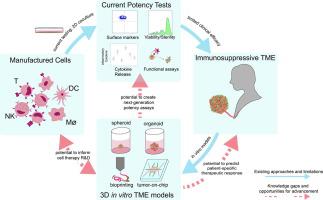Advanced Drug Delivery Reviews ( IF 15.2 ) Pub Date : 2021-10-13 , DOI: 10.1016/j.addr.2021.114003 Rachel Ringquist 1 , Delta Ghoshal 2 , Ritika Jain 2 , Krishnendu Roy 2

|
The tumor microenvironment (TME) is shaped by dynamic metabolic and immune interactions between precancerous and cancerous tumor cells and stromal cells like epithelial cells, fibroblasts, endothelial cells, and hematopoietically-derived immune cells. The metabolic states of the TME, including the hypoxic and acidic niches, influence the immunosuppressive phenotypes of the stromal and immune cells, which confers resistance to both host-mediated tumor killing and therapeutics. Numerous in vitro TME platforms for studying immunotherapies, including cell therapies, are being developed. However, we do not yet understand which immune and stromal components are most critical and how much model complexity is needed to answer specific questions. In addition, scalable sourcing and quality-control of appropriate TME cells for reproducibly manufacturing these platforms remain challenging. In this regard, lessons from the manufacturing of immunomodulatory cell therapies could provide helpful guidance. Although immune cell therapies have shown unprecedented results in hematological cancers and hold promise in solid tumors, their manufacture poses significant scale, cost, and quality control challenges. This review first provides an overview of the in vivo TME, discussing the most influential cell populations in the tumor-immune landscape. Next, we summarize current approaches for cell therapies against cancers and the relevant manufacturing platforms. We then evaluate current immune-tumor models of the TME and immunotherapies, highlighting the complexity, architecture, function, and cell sources. Finally, we present the technical and fundamental knowledge gaps in both cell manufacturing systems and immune-TME models that must be addressed to elucidate the interactions between endogenous tumor immunity and exogenous engineered immunity.
中文翻译:

了解和改进针对癌症的细胞免疫疗法:从细胞制造到肿瘤免疫模型
肿瘤微环境 (TME) 是由癌前和癌性肿瘤细胞与基质细胞(如上皮细胞、成纤维细胞、内皮细胞和造血来源的免疫细胞)之间的动态代谢和免疫相互作用形成的。TME 的代谢状态,包括缺氧和酸性生态位,会影响基质细胞和免疫细胞的免疫抑制表型,从而对宿主介导的肿瘤杀伤和治疗产生耐药性。许多体外正在开发用于研究免疫疗法(包括细胞疗法)的 TME 平台。然而,我们还不了解哪些免疫和基质成分是最关键的,以及回答特定问题需要多少模型复杂性。此外,用于可重复制造这些平台的适当 TME 细胞的可扩展采购和质量控制仍然具有挑战性。在这方面,免疫调节细胞疗法的制造经验可以提供有益的指导。尽管免疫细胞疗法在血液癌症中显示出前所未有的结果,并且在实体瘤中具有前景,但它们的制造带来了巨大的规模、成本和质量控制挑战。本综述首先概述了体内TME,讨论肿瘤免疫领域中最有影响力的细胞群。接下来,我们总结了目前针对癌症的细胞疗法和相关制造平台的方法。然后,我们评估了 TME 和免疫疗法的当前免疫肿瘤模型,突出了复杂性、结构、功能和细胞来源。最后,我们提出了细胞制造系统和免疫 TME 模型中的技术和基础知识差距,这些差距必须解决以阐明内源性肿瘤免疫和外源性工程免疫之间的相互作用。











































 京公网安备 11010802027423号
京公网安备 11010802027423号